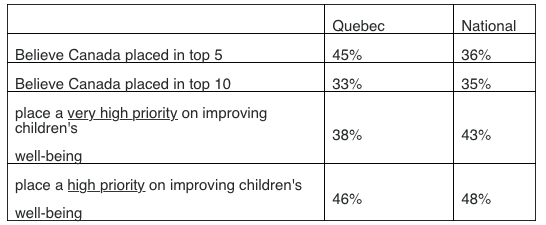New Poll Reveals Majority of Canadians Believe Our Country Ranks in Top 10 for Children’s Well-Being. In Reality, Canada Ranks 25th
Poll Released on National Child Day and the 30th Anniversary of the UN Convention on the Rights of the Child

One of Canada’s top child advocacy groups, Children First Canada, has released a new poll on Canadian’s attitudes on the wellbeing of our country’s kids. The poll is being released today on the occasion of National Child Day and the 30th Anniversary of the UN Convention of the Rights of the Child.
According to the new poll, 71% believe Canada ranks in the top 10 compared to other wealthy nations, with 36% believing it ranks in the top 5. In fact, Canada ranks 25th overall.
Once informed of Canada’s actual rank, nine in ten respondents said Canada should put a high priority on improving children’s well-being, with 4 in 10 believing it should be a very high priority.
The number of Canadians prioritizing children’s well-being has increased since the poll was last conducted in 2016. Then, 86% said it was a high priority (compared to 91% today) and 24% said it was a very high priority (increasing 19 points to 43% in 2019).
“It’s discouraging to know there is so much work that needs to be done to improve the health and wellbeing of Canada’s children, but Canadians aren’t aware of the problem. What this poll shows us is that when Canadians become aware of the state of our children, they strongly support urgent action to improve our kids’ wellbeing,” Says Sara Austin, Founder and CEO of Children First Canada.
“As Canadians celebrate National Child Day, the federal cabinet is being sworn into office. Children First Canada urges the Prime Minister and his Cabinet to put our children at the top of the agenda, and to swiftly take action on the long-standing recommendations to appoint an independent Commission for Children and Youth,” adds Austin.
Today has additional significance for Austin because it is the 30th anniversary of the UN Convention of the Rights of the Child and National Child Day. In the early 2000s, the child advocate lobbied the United Nations to pass the “Third Optional Protocol,” which allows children to hold their governments accountable for the protection of their rights. The protocol was passed in 2011, but has yet to be ratified by Canada.
As part of its unveiling of today’s report, Children First Canada is also holding an event in Ottawa to bring together children and youth to learn about their rights and the Canadian Children’s Charter. The event will also assemble representatives from federal government and Canada’s leading charities, hospitals, research institutes and major corporations to discuss current challenges and create a plan of action.
Satellite events will also take place across the country, bringing together youth and adult leaders to be part of a national conversation on how to make Canada the best place in the world for kids to grow up.
“Children have a right to be at the table when decisions are being made that impact their future. They have a voice and it needs to be heard,” adds Austin.
Top issues affecting children as identified by poll respondents:
1. mental health/depression/anxiety – mentioned by 48% of respondents
2. Bullying/safety online – mentioned by 34% of respondents
3. Health/fitness/obesity/nutrition: mentioned by 32% of respondents
4. Schools/education: mentioned by 31% of respondents
5. Poverty/poor families: mentioned by 31% of respondents
6. Domestic violence/child abuse and post-secondary education: both cited by 23% of respondents
“It’s heartening to hear that Canadians are concerned about the issues that matter most to our children,” say Austin. The top priorities identified in the poll are well aligned with the research released earlier this by Children First Canada in the Raising Canada report on the top 10 threats to Canada’s kids.
Other findings:
- Only 54% believe that young Canadians get the support they need to achieve their full potential (only 7% stating they totally agree)
- 92% believe that investing in children now saves additional spending in the future
- 59% believe Canada is not doing its best for poor people
The study was conducted by Ipsos on behalf of Children First Canada and two of its partners: Children’s Healthcare Canada and the IWK Health Centre.
*
Note to readers: please click the share buttons above or below. Forward this article to your email lists. Crosspost on your blog site, internet forums. etc.


